 |
World History
Urban II Calls for the First Crusade
Hugh O’Reilly
With the aim of extending the empire of the Catholic Religion and the power of the Holy See in the East, Pope St. Gregory VII had already exhorted the faithful to take up arms against the Muslims, he himself promising to lead them to Asia.
In his letters St. Gregory VII spoke how the sufferings of the Catholics in the East had touched him to the point that he desired death. He said he would like to risk his own life in order to free the Holy Places. St. Gregory VII, however, was not able to realize his plan due to internal problems in Europe.
The Pope convokes the Council of Clermont
Moved by the same spirit as his predecessor, Blessed Urban II resolved to convoke the Council of Clermont in November of 1095 in southern France, the heart of the warrior nation which for many centuries had set the tonus for Europe.
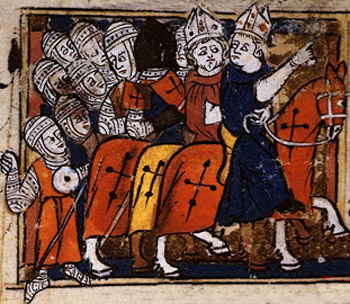
Crusaders led by Bishops |
Responding to the call were more than 200 Archbishops and Bishops, 4,000 ecclesiastics and 30,000 laymen. The most famous Saints and Doctors honored it with their presence and illuminated it with their counsels.
The Truce of God was proclaimed at the same time as the War of God. [The Truce of God granted immunity from violence to the peasants and clergy who could not defend themselves.]
The Council passed numerous decrees for ecclesiastical discipline and the reform of the Church, including ones concerning simony and clerical marriage. But all these decrees – even the excommunication of Philip I, the King of France, for adultery - did not manage to deviate the general attention from the point that was considered the most important, which was the captivity of Jerusalem and the abuses taking place there.
On the day of Pope Urban’s speech, the Council convened in the large square outside the eastern gate of Clermont where the papal throne was set up in order to accommodate the immense crowd. The Pope, followed by his Cardinals, processed in and the meeting began.
The Pope speaks
After Peter the Hermit, Urban II rose to speak, saying these moving and memorable words:
"We have heard the message of the Christians of the East. It described to you the lamentable situation of Jerusalem and the people of God. It described how the city of the King of Kings, which transmitted the pure Faith to all the other cities, was obliged to pay service to pagan superstitions. And how the miraculous Sepulcher where death could not guard its Prisoner, the Sepulcher which is the source of future life and, above all, where the Sun of the Resurrection rose, was befouled by those who will not rise again except to serve as straw for the eternal fire.
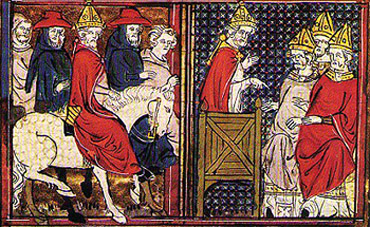
Pope Urban II arriving and preaching at the Clermont Council |
"A victorious impiety has suffused the most fertile lands of Asia in darkness. The cities of Antioch, Ephesus and Nicaea already are taken by the Musselmen. The barbarous hordes of Turks pitch their standards at the very borders of Hellespoint [where the Aegean Sea meets the Sea of Marmara], where they threaten all the Christian nations. If the one true God does not contain their triumphant march, arming their children, what nation, what kingdom will be able to close the doors of the West to them?
“The people worthy of glory, the people blessed by God Our Lord, moan and fall under the weight of these outrages and most shameful humiliations. The race of the elect suffers outrageous persecutions, and the impious race of the Saracens respects neither the virgins of the Lord nor the colleges of priests. They run over the weak and the elderly, they seize the children from their mothers so that they might forget, among the barbarians, the name of God. That perverse nation profanes the hospices … The temple of the Lord is treated like a criminal and the ornaments of the sanctuary are robbed.
“What more shall I say to you?
“We are disgraced, sons and brothers, who live in these days of calamities! Can we look at the world in this century reproved by Heaven to witness the desolation of the Holy City and remain in peace while it is so oppressed? Is it not preferable to die in war rather than suffer any longer so horrible a spectacle? Let us all weep for our faults that raise the divine ire, yes, let us weep… But let not our tears be like the seed thrown into the sand. Let the fire of our repentance raise up the Holy War and the love of our brethren lead us into combat. Let our lives be stronger than death to fight against the enemies of the Christian people.”
Do not cowardly stay in your homes
The Pontiff continued: “Warriors who hear my voice, you who will go to war, rejoice, because you are taking up a legitimate war … Arm yourselves with the sword of the Maccabees and go to defend the house of Israel who is the daughter of the Lord of Armies.
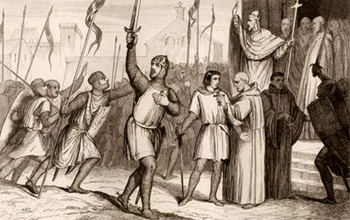
Receiving the Cross to deliver Jerusalem |
“It is no longer a matter of avenging just the injuries made to men, but rather those made to God. It is no longer a matter of attacking a city or a castle, but of conquering the Holy Places. If you triumph, the blessings of Heaven and the kingdoms of Asia will be your reward. If you succumb, you will achieve the glory of dying in the same Land where Jesus Christ died, and God will not forget that He saw you in the Holy Militia.
“Do not cowardly stay in your homes with profane affections and sentiments. Soldiers of God, hear nothing but the laments of Sion. Break all your earthly bonds and remember what the Lord said: “He who loves father or mother more than Me is not worthy of Me…. And every one that forsakes his houses, or brethren, or sisters, or father, or mother, or wife, or children, or lands, for My name's sake, shall receive a hundredfold, and shall inherit everlasting life.”
This speech of Urban II touched the hearts of all. It seemed as if an ardent flame had descended from Heaven.
The assembly, taken by an enthusiasm that no mere human eloquence had inspired, raised up in a mass and shouted: “Deus vult! Deus vult!” [God desires it! God desires it!”]
When silence was reestablished, the Holy Pontiff continued:
“Behold here today is fulfilled in you the promise of the Lord who said that where His disciples are gathered together in His name, He is there in the midst of them. If the Savior of the world is now among you, it was He who inspired that which I have just heard. It was He who has drawn forth from you this war-cry, ‘God desires it!’ and let it be raised everywhere as witness to the presence of the Lord God of Armies!”
The Pope raised up before the assembly the Cross, the sign of Redemption, and said: “It is Jesus Christ Himself who leaves His Sepulcher and presents to you His Cross. It will be the sign that will unite the dispersed children of Israel. Raise it to your shoulders and place it on your chests. Let it shine on your arms and banners. Let it be for you the reward of victory or the palm of martyrdom. It will be an unceasing reminder that Our Lord died for us and we should die for Him.”
Excommunication for those who do not fulfill the oath
The Bishop of Puy, reputed for his knowledge and firmness, was the first to enter onto the pathway of God, taking the Cross from the hands of the Pope. Many others followed his example.
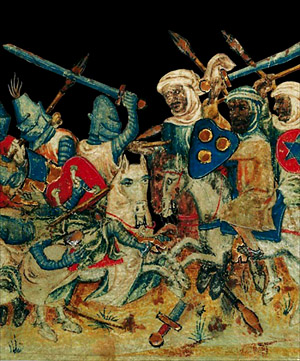
Crusaders and Muslims in battle |
The Pope promised the crusaders absolution for their sins. And he placed their persons, families and goods under the protection of the Church and of the Apostles St. Peter and St. Paul.
The Council declared that anyone who made violence against the soldiers of Christ would be punished with the anathema.
The Holy Father regulated the discipline and fixed the departure date for those who had enlisted in the Holy Militia. Fearful that some might remain in their cities because of self interest, he threatened those who failed to carry out their oaths with excommunication.
Urban II traveled through various provinces of France to complete his work, convoking other councils. This boundless enthusiasm followed him and communicated itself to the rest of the French people, and then spread to England, Germany, Italy and even Spain, which was combating the Saracens on its own territory.
The whole West was moved by these words: “He who does not take up his cross and follow Me is not worthy of Me.”
Religion was the only goal of the war against the infidels. Love of parents, the bonds of family and even the most tender affections were sacrificed for the ideals that overtook all Europe. Moderation was cowardice, indifference was betrayal, and opposition, an outrage and sacrilege.
Miracles
Numerous miracles helped to raise the enthusiasm of the multitudes. Stars detached themselves from heaven and fell to earth; unknown fires struck in the air; clouds took the color of blood, and a threatening comet appeared in midday in the form of a sword. Many of the French saw Charlemagne exhorting the Christians to combat the infidels.
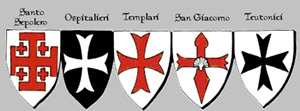
All the Orders of Chivalry took the Cross as their symbol |
“Receive this sword in the Name of the Father, and of the Son, and of the Holy Ghost.”
The priest of each parish blessed the arms that were piled up before him. He begged the All-Powerful Lord to grant to those who would bear them the valor and strength that led David to defeat the unfaithful Goliath.
Upon delivering to each knight the sword that had been blessed, the priest would say: “Receive this sword in the Name of the Father, and of the Son, and of the Holy Ghost. May it serve you for the triumph of the Faith. However, do not shed innocent blood with it.”
After sprinkling the standards of the Cross with holy water, he delivered them over, saying, “Go to combat for the glory of God and let this sign make you triumph in all dangers.” The crusaders received their symbols on their knees.

Selected and translated from
Joseph François Michaud, Las Cruzadas, Ed. Argentina, 1886, Vol. I, pp 33-34
Posted April 18, 2008

Related Topics of Interest
 Departing for the First Crusade Departing for the First Crusade
 Understanding the Crusades Understanding the Crusades
 A Counter Crusade and New Notion of Infallibility A Counter Crusade and New Notion of Infallibility
 Blessed Urban II Blessed Urban II
 Debunking Myths about Life in the 1500s Debunking Myths about Life in the 1500s
 The Swan's Song of Galileo's Myth The Swan's Song of Galileo's Myth
 The Immaculate Character of the Church The Immaculate Character of the Church
 How a Catholic Should Act in face of Bad Popes How a Catholic Should Act in face of Bad Popes

|
History | Home | Books | CDs | Search | Contact Us | Donate

© 2002- Tradition in Action, Inc. All Rights Reserved
|
 |
|